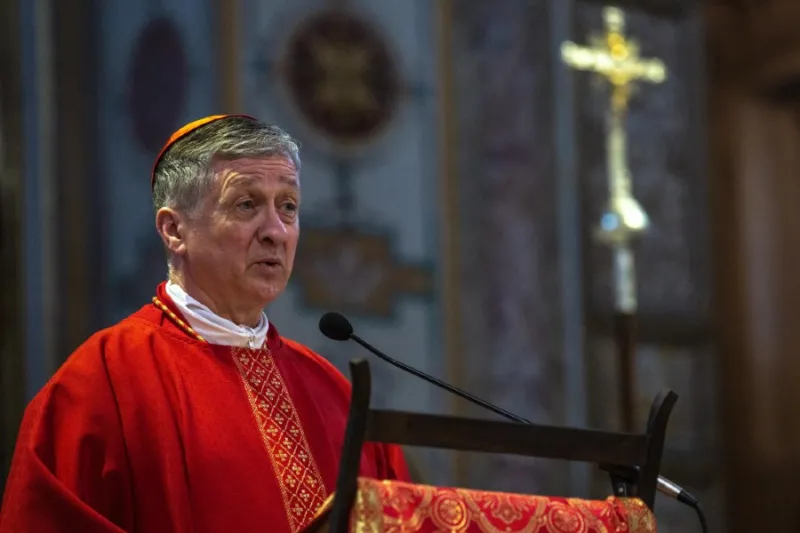
Washington D.C., Jun 15, 2021 / 11:08 am (CNA).
Ahead of important international meetings this week, Cardinal Blase Cupich of Chicago urged President Joe Biden and other world leaders to work for “a world without nuclear weapons” as a “moral necessity.”
Cardinal Cupich wrote an op-ed published in The Hill on June 11, before Biden and Russian President Vladimir Putin are scheduled to meet on June 16 in Geneva. American and Russian diplomats are expected to begin negotiations on eventually replacing the 2010 New START nuclear arms control treaty, according to Politico. The two nations each control around 6,000 nuclear weapons each – about 90% of the world’s total stockpile.
Cupich wrote that at Thursday’s summit between Biden and Putin, “top on the agenda should be establishing a climate in which the Review Conference can succeed in reducing the nuclear threat.” He argued that the moment “could not be more urgent.”
“Nuclear weapons pose an existential threat to all life on Earth,” Cupich wrote. “Working toward a world without nuclear weapons, in which vigorous international monitoring and enforcement mechanisms verify compliance, is not some utopian dream. It is, rather, a practical and moral necessity.”
The United States and Russia, as the two countries controlling most of the world’s nuclear weapons, “have unique responsibilities in taking the lead to eliminate the nuclear threat,” he said.
The New START nuclear arms control treaty was set to expire in February before the Biden administration agreed to extend it for another five years. The United States and Russia are expected to discuss what will replace the treaty in 2026. The 2010 agreement limited the number of strategically-deployed nuclear warheads for each country and allowed 18 annual on-site inspections of nuclear facilities by the other country.
Other bishops – including Pope Francis – have advocated for a world without nuclear weapons.
Earlier this year, the Catholic bishops of Hiroshima and Nagasaki applauded the UN Treaty on the Prohibition of Nuclear Weapons, while expressing regret that more countries – including their own – did not sign it.
“As Catholic bishops and Japanese citizens of the A-bombed cities, we share Pope Francis’ confidence that a world free of nuclear weapons is possible and necessary ‘to protect all life,’” Archbishop Mitsuaki Takami of Nagasaki and Bishop Mitsuru Shirahama of Hiroshima wrote in a joint statement on Jan. 22.
The UN treaty – which went into effect in January – marked the first multilateral nuclear disarmament treaty in more than twenty years. It was signed by 86 states, including the Holy See. But the world’s main nuclear powers – including the United States – did not ratify the treaty.
During a 2019 visit to the site of the 1945 atomic bomb detonation over Nagasaki, Pope Francis said, “This place makes us deeply aware of the pain and horror that we human beings are capable of inflicting upon one another.”
“Peace and international stability,” Pope Francis said, “are incompatible with attempts to build upon the fear of mutual destruction or the threat of total annihilation.”
If you value the news and views Catholic World Report provides, please consider donating to support our efforts. Your contribution will help us continue to make CWR available to all readers worldwide for free, without a subscription. Thank you for your generosity!
Click here for more information on donating to CWR. Click here to sign up for our newsletter.





Certainly a wonderful prospect nonetheless a dream. Cardinal Cupich has a right to dream good things, although reality speaks otherwise. Evil would have to be eradicated worldwide every person saintly. As long as evil men exist the threat of nuclear attack requires the possession of a nuclear deterrent. As unfortunate and non utopian as that is, it would otherwise be politically disastrous. At a level of practicality we necessarily separate religious solicitude from polity. Apostolic tradition has long held the right to self defence [we also have a moral obligation to defend the weak, the person threatened with violence, which putatively encompasses nations] surrendering it without absolute assurance is mistaken, and an unrealistic expectation. In that context Pope Francis’, “Peace and international stability are incompatible with attempts to build upon the fear of mutual destruction or the threat of total annihilation” is unrealistic although morally correct if nuclear or any weaponry is in fact used to intimidate and coerce.
I’m afraid I stopped listening to Cdl. Cupich some time ago.